Clearly, the instructions issued by the magnificent John Bloor to his Triumph engineers a few years ago have been taken to heart.
“Don’t fuck it up,” Big John said. And the factory has wholeheartedly complied. Triumph does not build bad bikes, or even OK bikes. They build good bikes, and really good bikes, and even the odd great bike.
Two of the latest additions to Triumph’s already impressive range are the Street Scrambler and Street Twin, which I had the pleasure of riding most recently – and mostly in the rain.
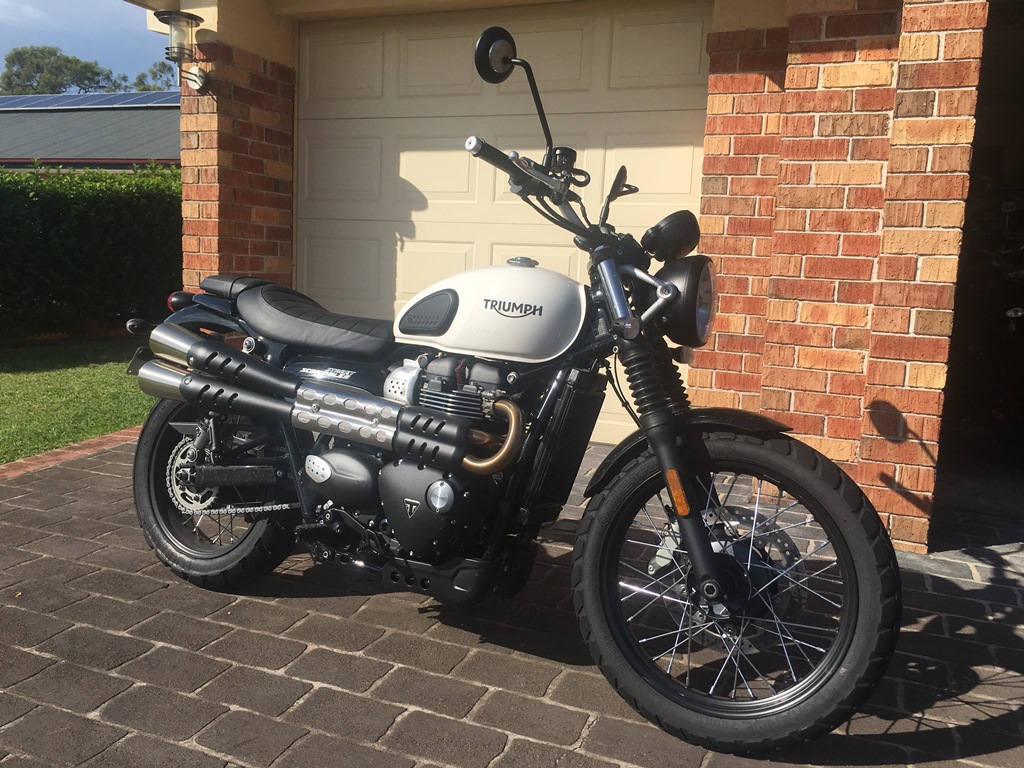
Now it’s kinda weird referring to 900cc bikes as “small” – but these are small, certainly from a physical perspective. Actually, perhaps “small” is not the right descriptor. I certainly had no trouble fitting on either of them and being comfortable. I would think “compact” is more apt. They do feel very compact and they do feel very light as a result – the Street Twin is 198kg dry and the Street Scrambler Scrambler is 203kg.
They are, at their very heart, a very competent and hugely enjoyable bike to ride – most especially in an urban environment, ie. Cities chocked with traffic and roadworks, with road surfaces varying from acceptable to diabolical.
That is not to say a man cannot go belting up his favourite rural road on either of them. He can and he should – and indeed he must, because they will delight him in this regard. And quite certainly surprise him.
They did me.
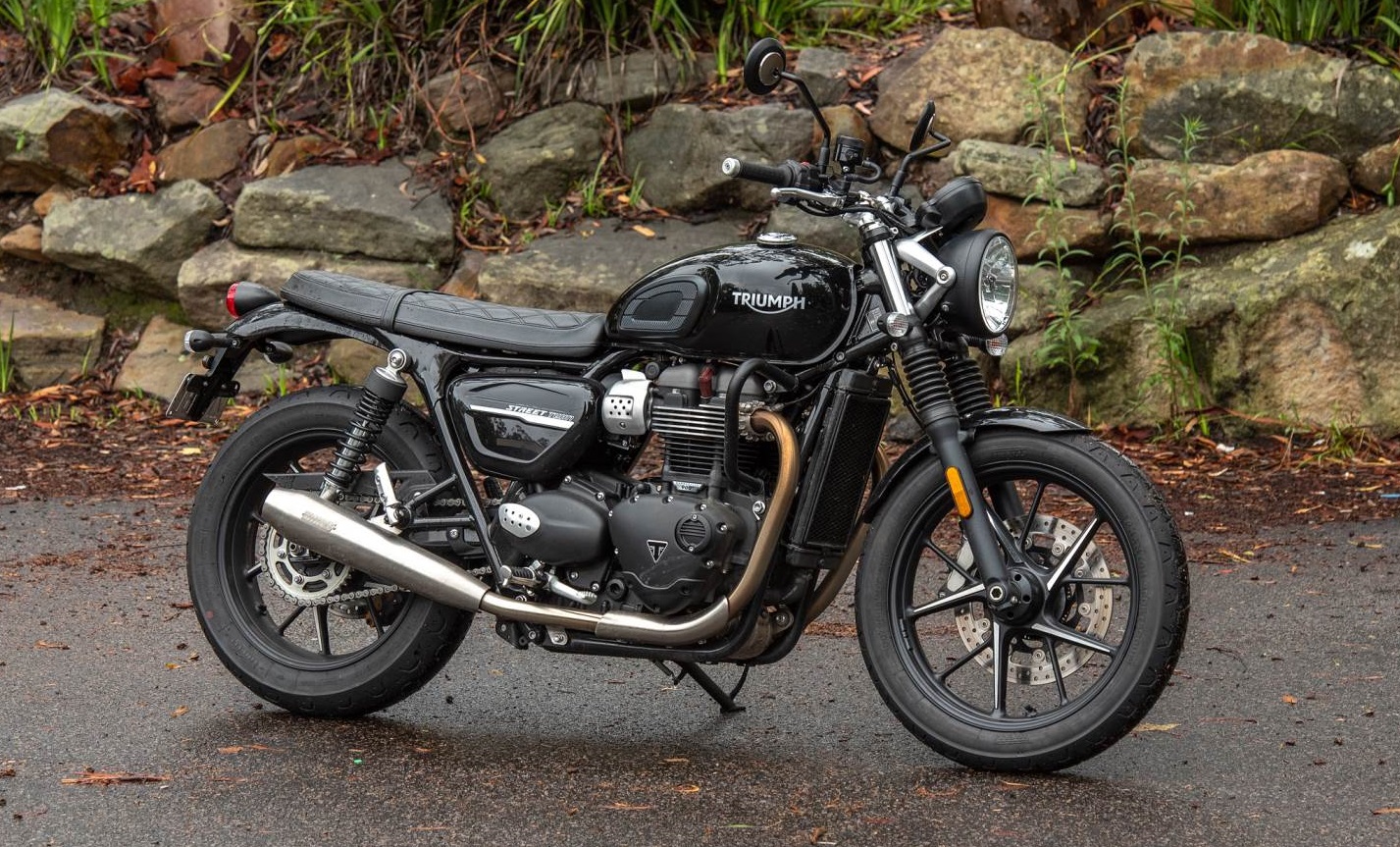
All eyes are of course on the 1200 iterations, one of which is sitting in my garage right now with a smug grin on its beautiful lines. My eyes were there too, so I was a bit “Meh” about the smaller versions.
Once again, I was wrong. I must stop pre-judging bikes based on my mostly medieval and toxically masculine prejudices.
I’ll deal with each bike separately below, because while they have the same engine and frame, they feel fundamentally different to ride.
The wheels are different (the Scrambler has a 19-inch front and spokes, the Twin has an 18-incher and its wheels are cast alloy). The Scrambler also has a slightly larger rear Nissin brake-rotor, 255mm versus 220mm on the Street.
And the ergos are certainly dissimilar.
So yeah, they ride a little different.
I think there’s a small tuning difference as well – the Scrambler makes its 80Nm of torque at 3200rpm, while the Street makes the same at 3800rpm. They both churn 64.1 horsies.
None of that will take your breath away, but nor will it disappoint you, especially the gentler souls. I am not a gentle soul and I enjoyed being able to ride the bikes flat out, so there’s that.
They are both very much mild-mannered, user-friendly bikes – and since I smashed both of them around the Putty-Wollombi Loop (close to 400kms of treachery, glory, and pay-attention-stupid) in the pouring rain, I know whereof I speak.
They are simple – and I like simple, because simple is good. They are very well-finished and you can (and I think you’re expected to) customise them via the factory goodies – 140-odd items for the Street and 120-odd for the Scrambler. But if you wanna go the gas-axe and matte-black spray can, I will salute you.
They both have USB plugs (hooray!), and they both have quite a bit of that ineffable British style that hearkens back to when girls wore skinny jeans, and the only thing in men’s beards was beer foam and pie crumbs.
Which one did I prefer?
The Scrambler. Not because it was a better bike. It’s not. It just provides a slightly wider dimension of ability.
Downsides are few and really just a vague grumble in one area.
I thought Triumph’s insistence on installing a pre-Jesus petrol cap on its retro models just pointless. A hinged petrol cap, thanks. One that cannot fall off the bike/bowser and ding its chrome, is what I’m thinking.
STREET TWIN
“What a pretty bike,” I muttered to myself. Then I looked around in case anyone noticed me having a conversation with the air. I was good. So I went on. “Classically proportioned…those Triumph tanks have always been sweet…oh look, a Vance & Hines can…, they’ve done away with the Amal look-alike fuel-injection jobby…”
I also looked at the slim, quilted seat and mentally prepared my buttocks for the ensuing brutalisation.
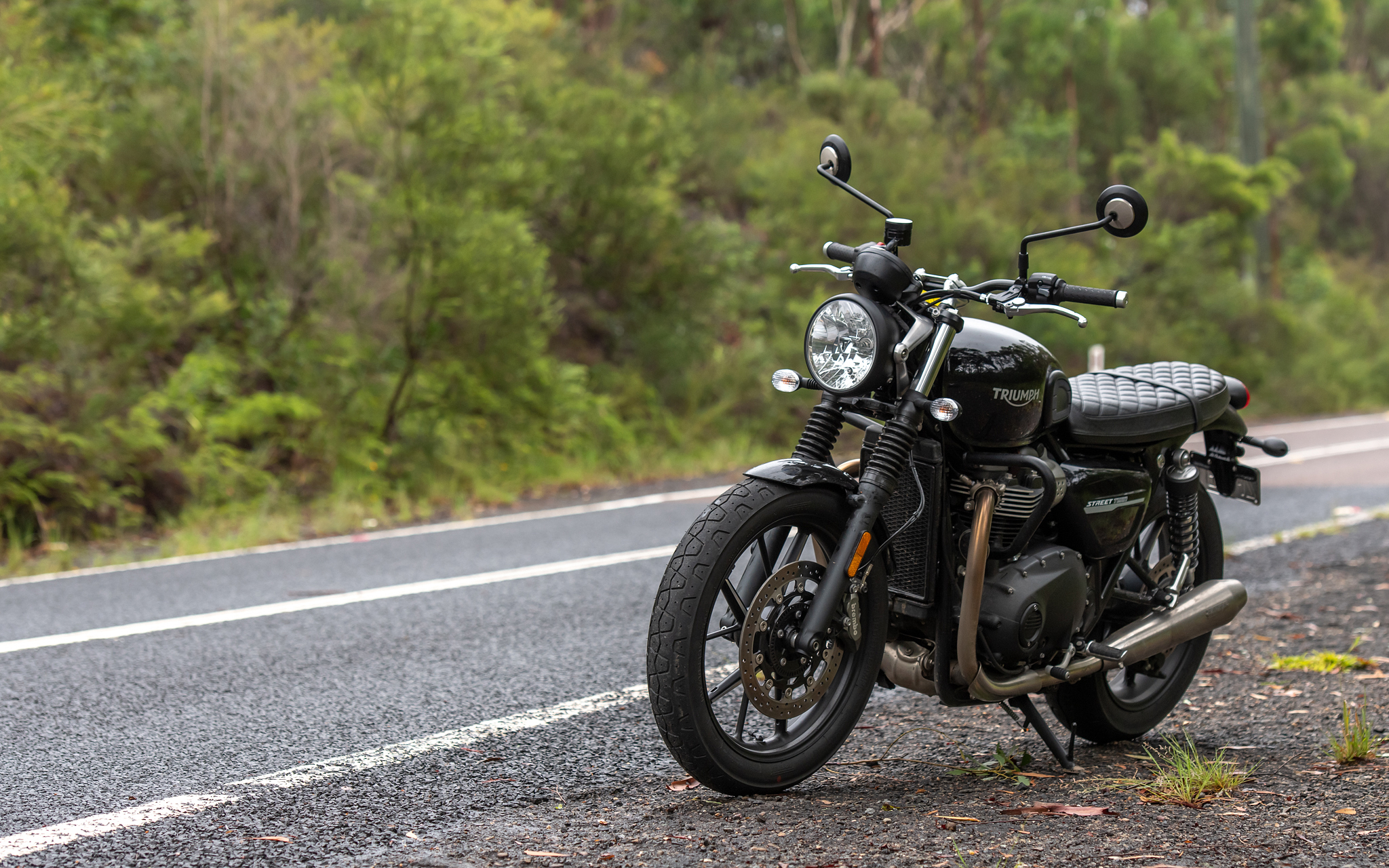
I was sure there would be cussing and loathing in a few very short kilometres. Nope. Nothing. The seat may look thin, but it was just fine. Belting along at 140 on the Putty’s rough straights demonstrated a few things to me – the seat is very good, the suspension is competent (only adjustable for pre-load on the rear KYBs) up to and until you decide you’re going to “show that dickhead on the (insert name of sportbike) what’s what. The riding position is dead neutral, so high speed and manic corner-carving ain’t the thing here.
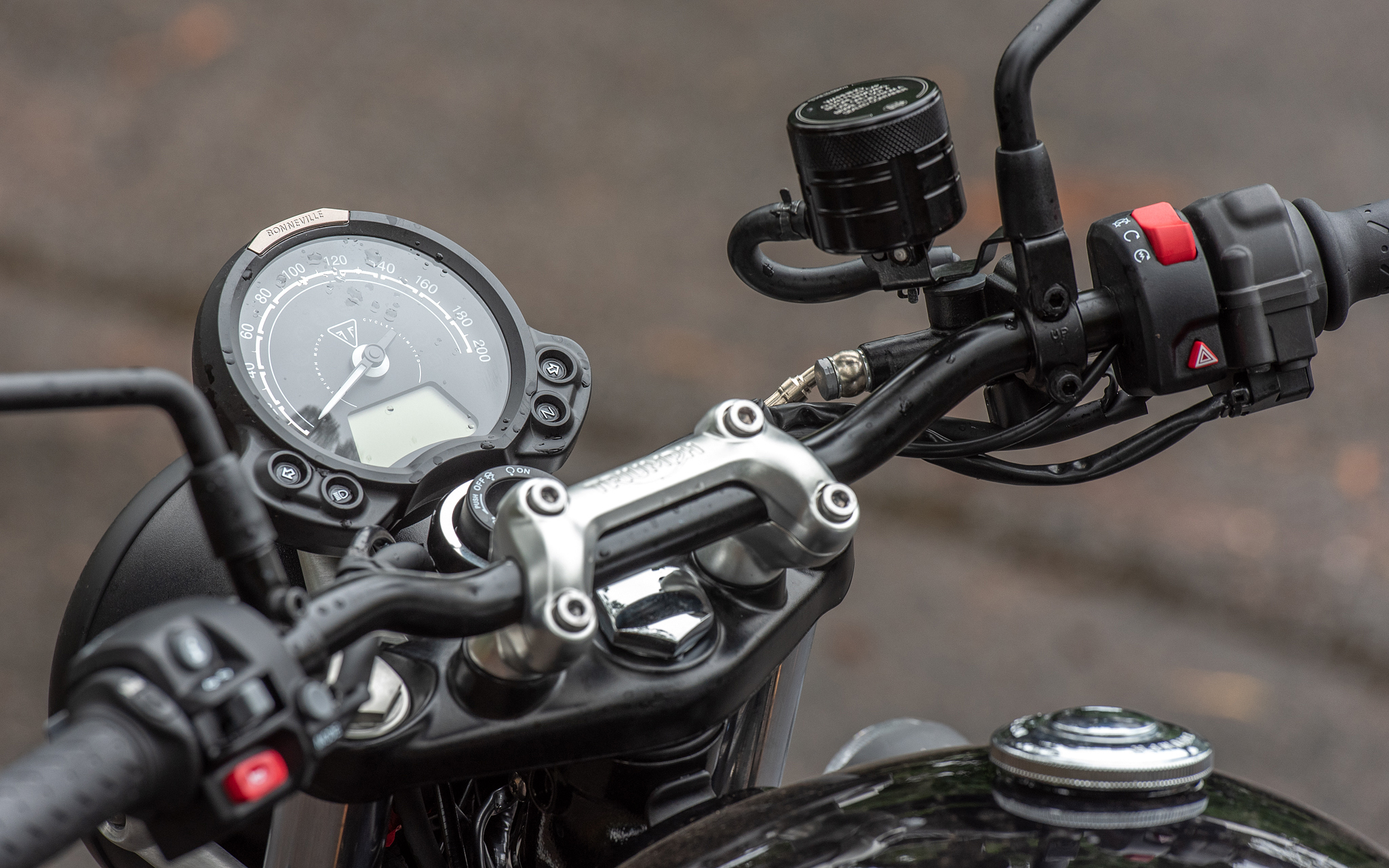
But when the rain came down – and Lord didn’t it come down – this compact, gentle, well-mannered motorcycle (which I had been shamelessly wringing at the neck) was on another level. It was great when the surface was wet rubbish out the back of Wollombi. It didn’t give me a moment’s pause as I went about my business. Well-sorted is an understatement, and because you can turn it into a LAMs bike with restrictors (and then un-restrict it when you grow up), it’s pretty ideal for people making their motorcycle bones.
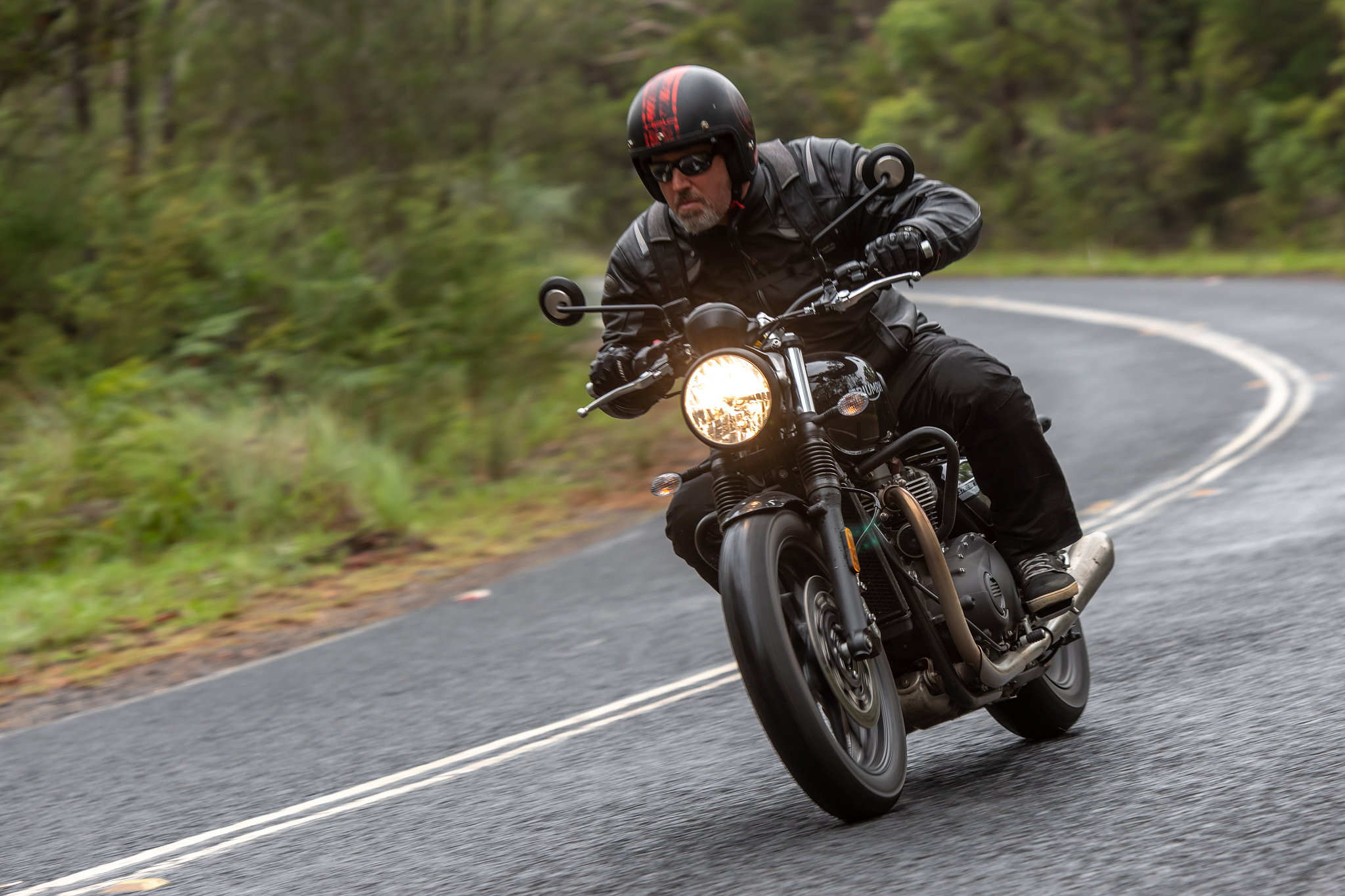
Vibration at speed is there, but not unpleasant – and I was up it for the rent. Ride like a Christian and it’s quite smooth. Ground clearance is good for the Street’s allotted place in the world, and the motor is a glorious torque-delivery system which does its very best work in the low and medium range. It does run out of puff approaching 160, so you won’t be escaping police custody on it. The fueling is great, and its low-speed handling is spot on, so lane-splitting and car-weaving is a doddle.
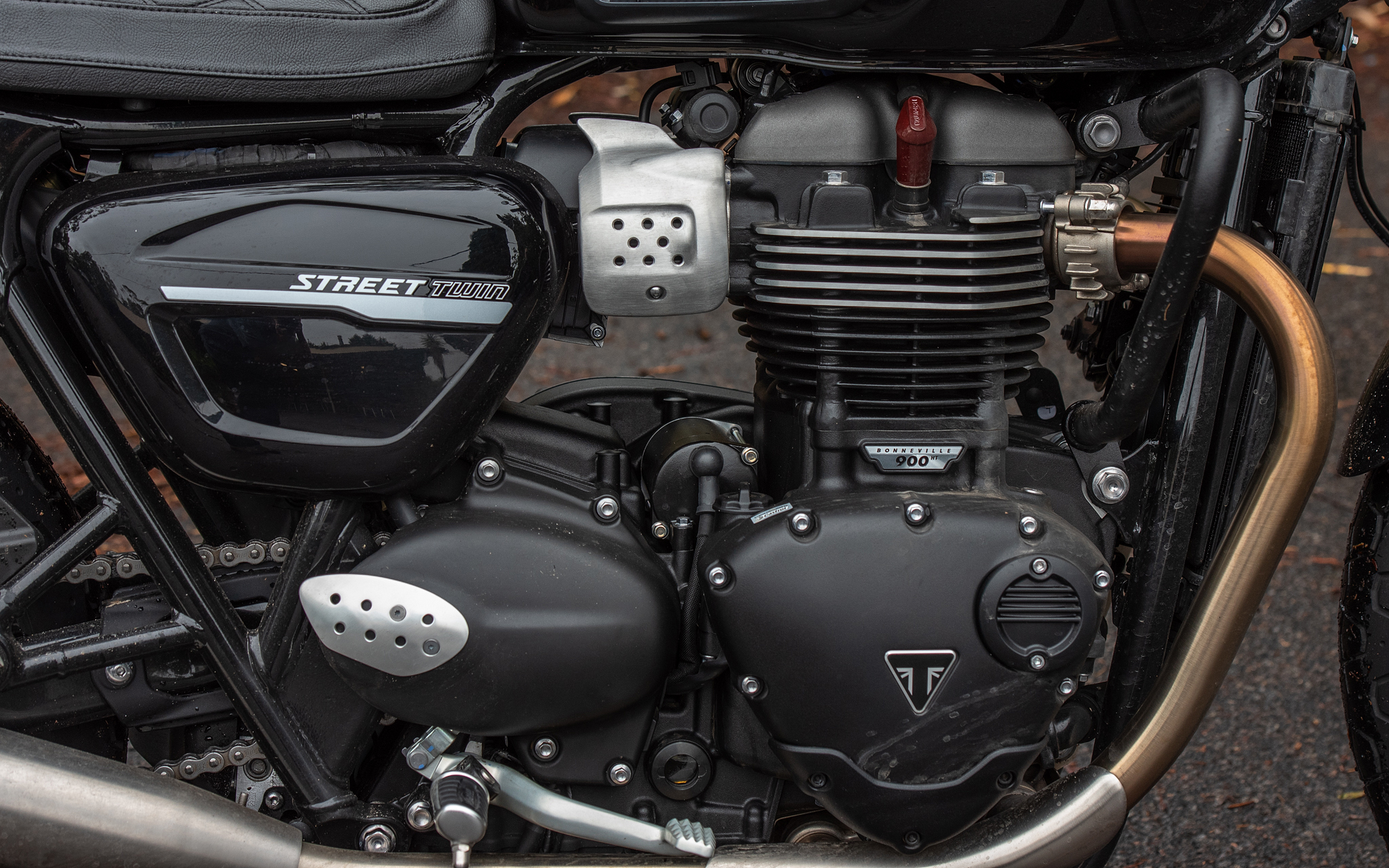
It holds a fast line through a corner pretty well, though if you insist a little it advises you in very gentle terms that “The Master might like to back it off a notch” by becoming more…um, reactionary to the road surface. Nothing terrifying, just not what the bike is designed to do – or tyred and suspended for.
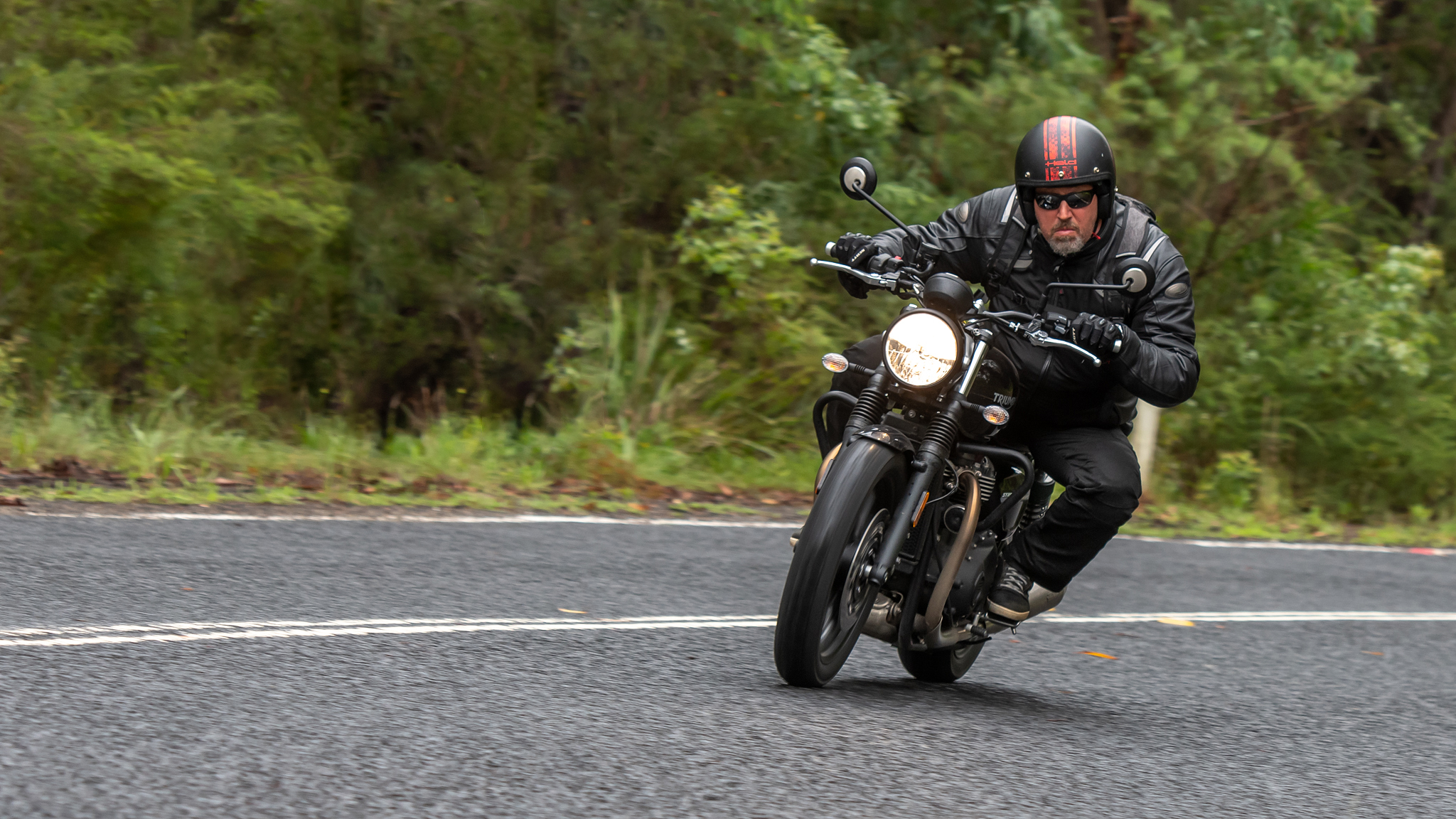
And what it’s also not designed to do is having a sleeping bag strapped to it. I did it anyway, but it was less than ideal in that regard. I’m sure there’s a rack you can buy that sorts this.
I think it’s a very cool bike. It’s a nice, measured, and very gratifying evolutionary step forward for Triumph.
STREET SCRAMBLER
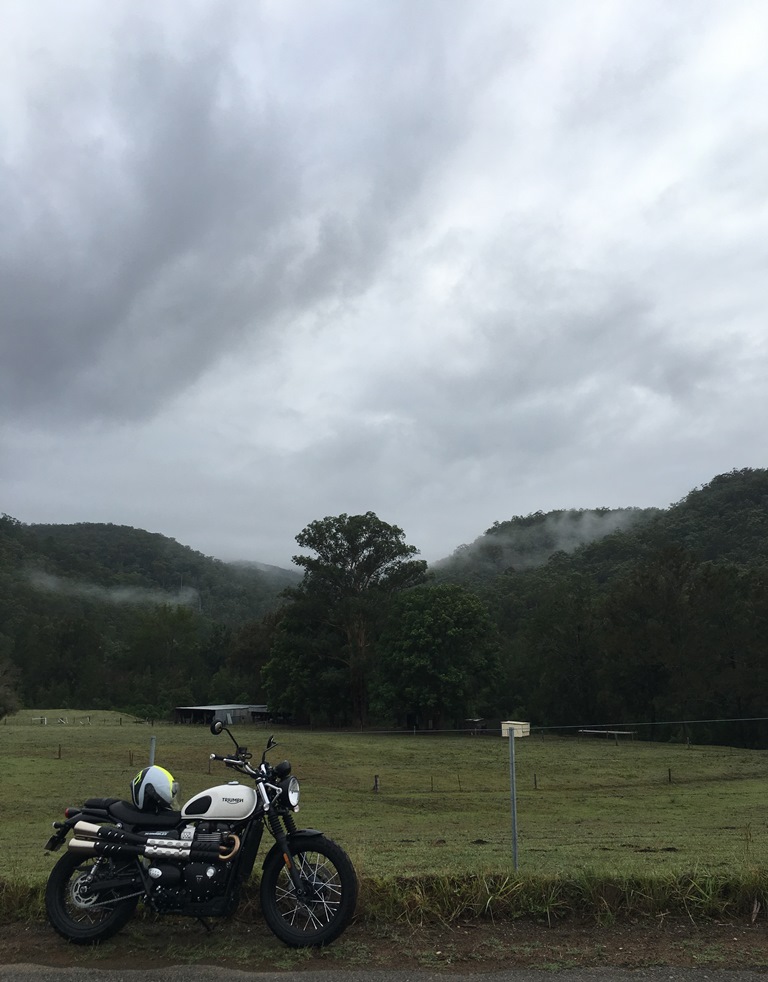 You’re going to ask me if it can actually “scramble”, aren’t you? Well, it’s not a dirt bike, but it has proper stand-up ergos, funky tyres and off-road mode which switches the ABS and traction control off. Which you should do so you can drift like Toby.
You’re going to ask me if it can actually “scramble”, aren’t you? Well, it’s not a dirt bike, but it has proper stand-up ergos, funky tyres and off-road mode which switches the ABS and traction control off. Which you should do so you can drift like Toby.
It’s also got those high-mounted pipes. And they will kiss your right thigh with their warm, alloy love. The heat-shielding is pretty good, and it didn’t quite burn me, but…you know, does it have to be like this in 2019? I guess it does, for form’s sake.
So can it scramble? Sure. Why not? It has some pretence to being able to deal with dirt – the wheels, the tyres, the bashplate – you can certainly take it down fire-trails. I’d stay away from trying to clear tabletops or serious adventure stuff, but on general principles, it’s fun to ride on the dirt. I didn’t do much dirt (hell, maybe 10 kays all up), but it’s the kind of bike with the kind of power delivery that won’t upset you into a tree.
I liked it more than the Street for a few reasons. I thought it looked more purposeful and antisocial. I have found myself on dirt tracks a bit lately (all my mates seem to be moving to remote locations), and while I’m not at all interested in a dedicated dirt bike, I very much appreciate a bike that is not uncomfortable when the road disappears.
If I was being a bit more serious about the dirt side, I would upgrade to the aftermarket Fox shockies and maybe swap the springs out of the front. Then I might be a little less tetchy when you forget yourself and start muttering nonsense like: “I reckon this would do Dakar”. It might. But neither of you will be happy or on the podium.
The Scramblers dirt pretensions do not at all affect its on-road manners, and I think that’s important. It’s seat-height is 30mm higher than the Street’s (790mm versus 760mm), but that is not really a tall seat height, and in fact, if you’re the kind of rider who shies from tall dual-purpose bikes, the Street Scrambler is certainly worth looking at.
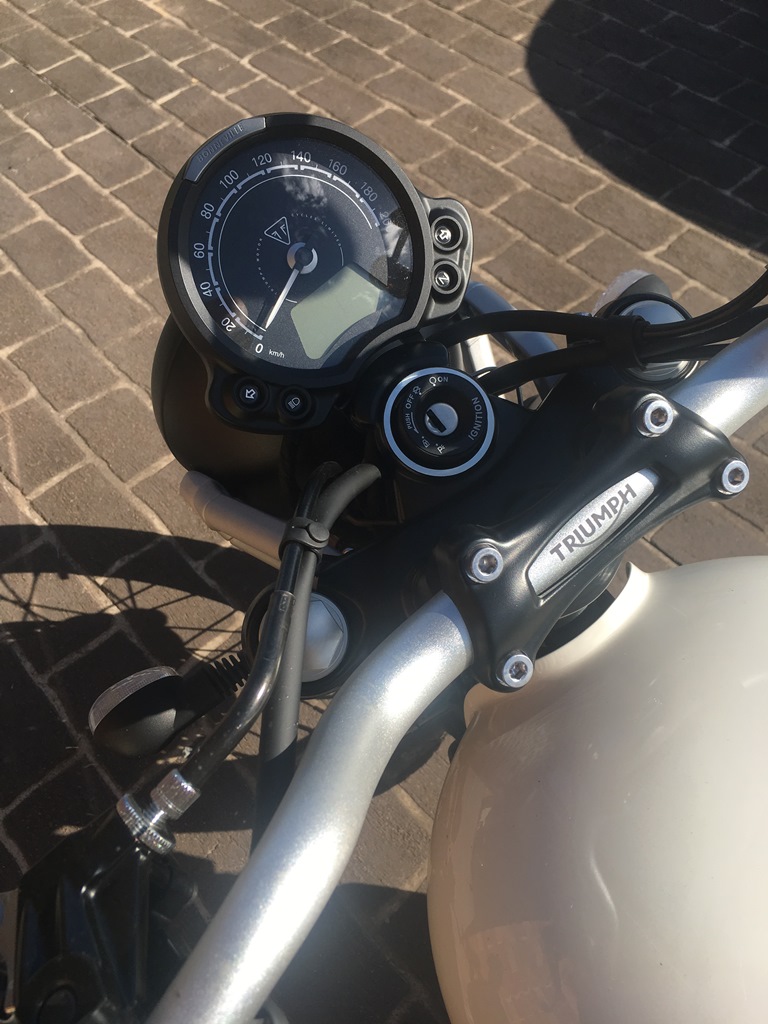
Once again, I spent a lot of my time riding it in the rain. And once again, the gentle power delivery and sure-footed feel of the package didn’t agitate my terror glands. I think I ran over a big, swift-moving, and amorous goanna just before one of the little bridges on the Wollombi road, but I was committed to the corner and any mad swerving would have put me in the river, so sorry about that, lizard. I understand some of your stuff may well grow back.
It is very much a ride-all day bike. Your speeds won’t be heinous, but you can sit on 120-130 with perfect equanimity. I’m thinking it’s happiest around town, like the Street, but it’s not all that unhappy if you decide to find out where that track goes – and yes, it’s light enough to pick up off the ground a few times without crying.
If I had to choose between the two, I’d pick the Scrambler. I reckon it just looks cooler. And then I’d tear off the heat-guard on the exhaust and live on the hateful edge, with properly seared thighs.
Further information and all the specs can be found here:
https://www.triumphmotorcycles.com.au/
Words by Boris Mihailovic
Images by Nick Edards / Half Light Photographic
